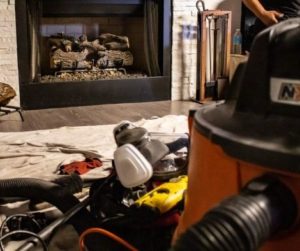There are two main types of fireplaces- those that use gas logs and those that use wood. Both have their benefits and drawbacks, so it’s important to understand the differences before making the decision on which to burn; if you have the option. In this blog, we will discuss the pros and cons of gas logs vs. wood burning fireplaces, so that you can make an informed decision on what is better for your home.
The Gas Log Pros: Gas Logs vs. Wood
The Convenience of Gas Logs
Burning Gas Logs are usually considered a more convenient fuel source than wood. Once the gas logs are lit, no additional work is required to keep the fire going. Gas logs are easier to control than a wood-burning fire. If you want a smaller fire that puts out less heat, you can adjust the amount of gas fueling the fire by turning the key on the side of the fireplace toward the “off” direction. If you are wanting a bigger fire with more heat, you can turn the key towards the “on” position and adjust as needed to create a bigger fire.
Gas Logs are easy to light and you don’t have to worry about storing anything additional- like wood, fireplace tools, and ash bucket. If you or a loved one has difficulty lifting heavier objects, like wood, then Gas Logs are most likely a better option for you. When you are ready to turn off the fireplace, you just simply turn the key to the “off” position to stop the fire from continuing- there is no waiting for the fire to dwindle during late night hours of the evening. Make sure you are thoroughly educated on fireplace safety, before lighting your fireplace.
Tip: With gas fireplaces, you should always be able to see the top of the flame in the firebox. If the flame top is not visible when looking at the fireplace straight on, we recommend adjusting the gas setting with the key.
 Gas Logs Pros: The Cleaner Burn
Gas Logs Pros: The Cleaner Burn
Creosote is a natural byproduct of burning wood and it can be extremely flammable. When too much creosote builds up in your chimney, it becomes a fire hazard. Gas logs do not produce creosote, but this does not exclude you from annual chimney inspections and sweeps. Gas Logs produce less smoke, so they can be considered better for the environment.
Fireplace Aesthetic: Another Gas Log Pro
Unlike wood-burning fireplaces, gas logs aren’t touched after installation so the upkeep is pretty simple year-round. During the warmer months, your fireplace may not be lit but it still looks aesthetically pleasing in your home in its uniform position. Gas logs are often made to look like real wood- so you get that wood-burning fireplace feeling without any of the hassle.
The Gas Log Cons: Gas Logs vs. Wood
Upfront Cost: Gas Logs vs. Wood
One of the disadvantages of Gas Logs is the initial investment. Gas logs can be more expensive upfront than wood-burning fireplaces, depending on the brand of gas logs and where you purchase them. However, over time Gas Logs can save you money because you won’t have to continuously purchase wood.
Your Home must have Gas to Supply Gas Logs
Another Gas Log Con is that your home must have gas to use them. Gas logs require a natural gas or propane fuel source to operate and if your home doesn’t have either of those, then you won’t be able to use Gas Logs. If your home has gas, but your fireplace is set up for wood burning, converting it to gas is considered another upfront cost with gas logs. Converting a wood-burning fireplace to a gas fireplace will cost you roughly $350-$700 to have a Certified Chimney Sweep complete the service.
A tip from a Dallas Chimney Sweep that’s been in the fireplace industry for 25 years:
We recommend high-quality gas logs that will last you years on end that are from a higher-end manufacturer. Oftentimes, we get homeowners that see log sets from big box hardware stores and compare the prices from their log selection to ours. What we often explain to the homeowners we serve is that the gas logs we sell are top-of-the-line gas logs. Yes, they are an initial investment, but they will last 5-10 years longer than the lower-quality sets (depending on usage, maintenance, and other factors). Not only do these log sets last longer, but they also look more realistic and higher-end in your fireplace.
Wood Burning Pros: Gas Logs vs. Wood
The Aroma and Ambiance of a Wood Fire
There’s nothing like the smell of burning wood in your fireplace- it’s often one of the main reasons people choose wood burning over Gas Logs. Unless you enjoy the smell of a balsam or fireside candle, Gas Logs just can’t produce that same amazing smell. Another pro for wood burning is the sound that emits from the fireplace as the wood burns. The crackling sound coming from a wood-burning fire is oddly satisfying and makes many people feel cozy and content.
Wood Burning: No Gas Needed
Just like Gas Logs need a gas source, wood-burning fireplaces need wood to function. If your home doesn’t have a gas line, you’re not out of luck when it comes to owning a fireplace. Wood-burning fireplaces are fueled by wood so as long as you have access to wood, you can use your fireplace.
The Cons of Choosing Wood Burning
Storage for your Fireplace Wood: Gas Logs vs. Wood
If you choose to burn wood you will need to have a place to store the wood. Depending on the size of your fireplace and burning frequency, you may need to store a large amount, which takes up space.
Correctly storing firewood is important to keep the wood dried out (seasoned). Wet or green wood is difficult to light, produces a lot of additional smoke, and less heat. Seasoned wood burns more efficiently, is cleaner to burn, and produces less pollution. Store wood off the ground on a covered rack to keep it protected from rain, snow, and ice.
The Clean-Up Required After Burning Wood
A wood burning con is the clean-up required afterward. After every fire, remove all cooled ashes from the firebox. Ashes can spark a flame even when they are cold, so it is essential to use a fire-proof container. We recommend using a metal pail with a lid to store ashes until you are ready to dispose of them.
 Chimney Sweeps
Chimney Sweeps
Wood-burning fireplaces need to be cleaned more often because burning wood can cause a buildup of creosote in your chimney. Creosote is very flammable and if it’s not swept out, it can cause a chimney fire. Homeowners should have their chimney’s inspected and swept at least once a year by a Certified Chimney Sweep to ensure there isn’t any buildup and that their fireplace is ready for use.
Reminder: Creosote or Chimney Sweeping logs, do not replace a chimney sweep service. Find out more here: CSIA Organization
What is a recommended brand of Gas Logs?
Real Fyre Gas Logs are some of the more realistic-looking, high-quality gas logs on the market. Gas Logs look like real wood. Gas Logs come in various sizes and styles to fit any fireplace. Masters Services Chimney & Masonry has been selling these gas logs for the past 15 years. When comparing with other gas logs on the market, not one came even close to the Real Fyre Gas Logs. RH Peterson manufacturers these logs with quality materials and craftsmanship to help make your logs last longer and provide your fireplace with a real fire in mind.
Conclusion: Gas Logs vs. Wood
In this blog, we discussed the pros and cons of gas logs and wood-burning fireplaces. We hope you can now make an informed decision on what is better for your home. Gas logs are more convenient because they don’t require any clean-up and you don’t have to worry about storing wood. Wood-burning fireplaces provide your home with a real fire smell and sound that can create a cozy ambiance. Although wood-burning fireplaces require more maintenance, many people find this to be worth it for a real fire experience.
If you have any questions about Gas Logs vs. Wood-Burning Fireplaces, please contact Masters Services Chimney & Masonry at 972-877-4650 or fill out our online form to schedule an appointment. We would be happy to help you!
We service Dallas-Fort Worth, Houston, and Oklahoma City!